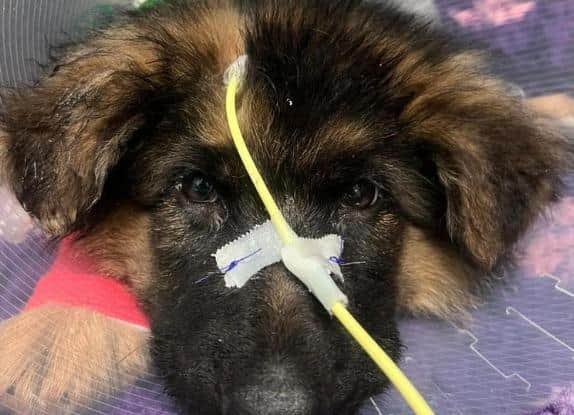Sheffield puppies: 12-week-old dog 'fighting for his life' with parvovirus needs your help
and live on Freeview channel 276
The animal rescue charity Helping Yorkshire Poundies has said the next 24 hours are ‘critical’ for the poor dog, who is called Moose. “Moose is so very poorly, but his body is now showing signs of fighting this terrible virus, so while he is fighting, with your help, we will keep fighting for him,” said the Rotherham-based charity.
“Moose’s bill is currently over £3,000 (he’s been having treatment since last Friday) … every single penny donated goes directly towards saving this beautiful boy’s life - PLEASE help if you can - this is a huge, huge ask, but we couldn’t just turn our back on him when he needed help the most.”
Advertisement
Hide AdAdvertisement
Hide AdWhat is parvovirus, what are the symptoms and how can I protect my dog?


Parvovirus infects cells of the intestines and white blood cells. The most common signs are very bloody diarrhoea, vomiting and lethargy, with dogs who have the virus tending to lie around more and eat less. Diarrhoea, vomiting and lethargy can also be symptoms of many other illnesses affecting dogs, but if you are concerned about your pet it is worth getting them checked out by a vet – especially if they show no signs of improvement after a couple of days.
If the diarrhoea is particularly nasty and the dog is very lethargic then you should seek advice straight away as dogs can go downhill very rapidly.
The mortality rate for dogs with parvovirus which receive early treatment is around 10 per cent, but it is much higher for dogs who are not treated. One vet, who has recently seen a number of parvovirus cases, warned there may have been mutations which have led to a new more easily transmitted strain of the virus.
Parvovirus is spread by faeces so it’s important to clean-up after your pet. It can remain on a contaminated surface for up to 12 months, a vet has said, meaning the best form of protection is to ensure your dog is vaccinated. A dog which has had parvovirus can also be infectious for up to 14 days from displaying symptoms and so should be isolated from other dogs during this period.
To donate to Helping Yorkshire Poundies, visit: https://helpingyorkshirepoundies.co.uk.